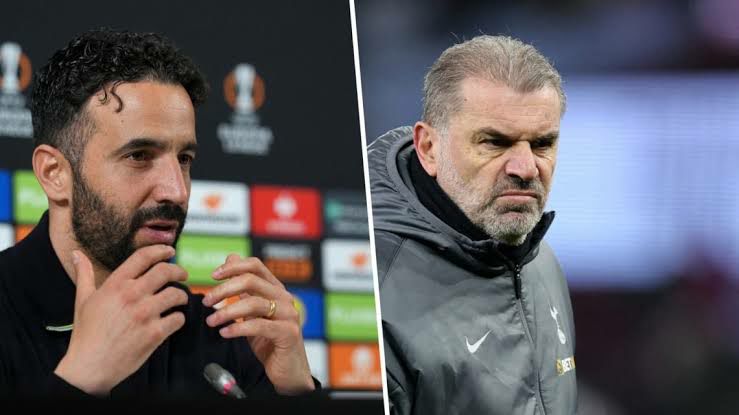Ruben Amorim disagrees with Ange Postecoglou over Europa League decision, ‘I don’t like that…’
As the Premier League season winds down and the Europa League final looms large, a familiar pattern played out this past weekend: both Tottenham Hotspur and Manchester United suffered defeats in their respective league matches.
However, unlike previous losses, this round of setbacks came with a fascinating subplot — one that underscores the strikingly different strategies employed by their managers in preparation for the all-important final.
Manchester United succumbed to a narrow loss against Chelsea, with Marc Cucurella finding the net in a tightly contested affair. Meanwhile, Tottenham endured a defeat at the hands of a clinical Aston Villa side. On the surface, neither result was particularly surprising, given that both clubs have had one eye firmly fixed on European glory. Yet the post-match press conferences revealed an intriguing point of contention between the two managers: how best to prepare for the biggest game of their respective seasons.

Just five days remain until the Europa League final, and while both clubs were afforded the same amount of preparation time — thanks to Spurs having their fixture moved forward — the philosophies of Ange Postecoglou and Ruben Amorim couldn’t be more different.
Postecoglou Prioritizes Player Welfare
Tottenham boss Ange Postecoglou opted for a cautious approach, fielding a completely rotated squad against Villa. With several key players recently sidelined — including Dejan Kulusevski, James Maddison, and Lucas Bergvall — Postecoglou made it clear that avoiding further injuries was his top priority.
“They’re all available and that’s the most important thing,” the Australian tactician explained after the match. “If something happened to them today, they wouldn’t be available [for the final], and I don’t think that would be the smartest course for us to take. We’ve already lost some key players recently.”
The decision, while conservative, ensured that Spurs came through their final domestic game unscathed. For Postecoglou, it was a calculated gamble — one designed to preserve his strongest lineup for what could be the club’s most significant European fixture in years.
Amorim Embraces Competitive Rhythm
In stark contrast, Manchester United’s Ruben Amorim took a more aggressive stance. Rather than rest his core players, Amorim selected what appeared to be his strongest possible starting XI against Chelsea. His reasoning? Maintaining competitive rhythm and match sharpness outweighed the potential risk of injury.
“We have five days to prepare the game,” Amorim explained post-match. “If I rested everyone, it would have been like going 10 days without a game — and I don’t like that. The best way to prepare for a final, when you have time to recover properly, is simply to compete.”
Amorim’s bold approach paid off in one critical aspect: none of his key players picked up injuries during the match. That now positions United with a perceived edge heading into the final, as their squad retains a sharper match rhythm compared to Spurs’ more rested, but potentially rusty, lineup.
A Tactical Gamble That Could Define a Season
This tactical divergence sets up a fascinating subplot for the Europa League final on May 21. On one hand, Tottenham’s players will be physically fresh but may lack recent high-intensity minutes. On the other, Manchester United’s stars will be in peak match condition but come with the baggage of increased fatigue — and the ever-present risk of delayed-onset injuries.
Ultimately, one approach will be validated under the bright lights of the final, and the other could be harshly scrutinized. If Spurs come out flat and fail to establish a rhythm, Postecoglou’s decision to rest his key players could be called into question. Conversely, if United’s energy wanes late in the game, Amorim’s full-strength XI strategy might be viewed as a miscalculation.
In football, the margin between brilliance and folly is often razor-thin. As the two clubs brace for a defining showdown, all eyes will be on which manager’s philosophy proves the wiser when the final whistle sounds in Dublin.